2026 Elections: Ugandans demand solutions land wrangles
The survey reached 6,006 citizens across 54 districts and revealed that land-related grievances have become a major political issue, particularly in the central region, where 40.8% of the respondents expressed alarm over land grabbing.
The survey also reveals several issues affecting land management, including cultural barriers to women’s land ownership and participation, livestock encroachment on farmlands, mismanagement of land sale proceeds, and displacement of homes due to land disputes (0.6%).

THE CITIZENS' MANIFESTO
At 85 years old, Regina Nalubega should be spending her sunset years in peace. Instead, she finds herself entangled in a fierce land conflict that has left her traumatised and imprisoned.
A resident of Lugangu village in Najja sub-county, Buikwe district, Nalubega says she legally acquired her land in 1980 from a man named Joseph Wasswa and has lived on it ever since.
Her troubles escalated following the death of her husband, when a dispute arose over the ownership of the land.
The matter ended up before a Grade One Magistrate, Martin Wakayemba, who ruled that Nalubega should vacate the land within 30 days and pay sh6m in costs.
She spent a month in prison and is now appealing for help. Her relatives have since petitioned the State House Anti-Corruption Unit, seeking urgent intervention.
According to Nalubega, the land originally belonged to the late Petero Bulagala, who divided it among his children.
Seven acres were given to Regina Nankunja, who is now fighting with her over the land, and one acre to a man named Yowana, who, Nalubega says, sold to Wasswa, from whom she later purchased a portion.
Her purchase agreement, dated March 8, 1980, remains her most tangible proof of ownership.
Nalubega’s story is one of many unfolding across the country, with Ugandans lamenting a surge in land disputes.
Results of a recent nationwide survey by Vision Group, conducted under the Citizens’ Manifesto initiative between March and May 2025, show that 48% of respondents identified land grabbing and insecurity as their most pressing concern as the country heads to the polls.
The survey reached 6,006 citizens across 54 districts and revealed that land-related grievances have become a major political issue, particularly in the central region, where 40.8% of the respondents expressed alarm over land grabbing.
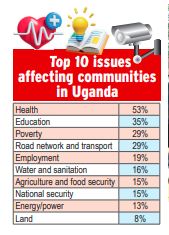
This was followed by the eastern region at 27.1%, the western region at 19.1%, and the northern region at 13.8%.
Kampala emerged as the area with the highest concern, with 66.7% of the participants citing land grabbing as their biggest issue. In Karamoja, 55.6% of the respondents raised similar fears.
Chief Justice Alfonse Owiny-Dollo recently acknowledged the scale of the problem, revealing that by the end of December last year, the Land Division of the High Court had a backlog of 26,560 unresolved land cases.
The growing number of disputes continues to strain the judicial system, leaving thousands of Ugandans in legal and emotional limbo.
Over the years, the value of land in most parts of the country, especially the central region has skyrocketed, particularly in and around urban centres, driven by rapid development, population growth, and a frenzied rush for real estate business.
Fraud and manipulation within the land sector are also on the rise
.
According to Ignatius Koomu, the LC5 chairperson for Nakaseke district, solving the problems of land wrangles and land grabbing take up much of the time of resident district commissioners.
Most affected
District-specific data from the survey showed Luwero as the most affected, with 88.9% of respondents pointing to land grabbing as their primary concern.
In Kikuube, the figure was 85.7%, while Kampala registered 66.7%. Other districts where land grabbing ranked highest included Moroto at 62.5%, and Kaberamaido, Kyegegwa, and Mpigi, each at 50%.
In Hoima, the figure stood at 46.2%. Conversely, in districts like Gulu, land grabbing was cited by only 21.2% of the respondents, and in Wakiso and Masaka, by just 16.7%. In Arua, the concern was lower, at 8.3%.

Lands minister Judith Nabakooba
The survey also reveals several issues affecting land management, including cultural barriers to women’s land ownership and participation, livestock encroachment on farmlands, mismanagement of land sale proceeds, and displacement of homes due to land disputes (0.6%).
Additionally, 0.4% of the respondents reported issues, such as landslides, unclear land ownership, corruption among land officials, and government officials using political power to claim land.
Sarah Nabakka, a resident of Masaka City, says land grabbers usually collide with officials from the lands ministry and security agencies, exacerbating the problem for powerless citizens and fuelling the unending land disputes.
“To address this, the government should prioritise awareness campaigns in rural areas, empowering communities with knowledge on land rights and protection,” Nabakka says.
The least common issues (0.2%) include unregulated land brokers, land misuse in government projects, lack of support for land grabbing victims, floods causing land degradation, fraudulent land titles, high title acquisition costs, unclear land regulations, insufficient development funds, terrain limitations, and land pollution from chemicals.
Tenure systems
Marlon Agaba, the executive director at the Anti-Corruption Coalition Uganda, highlighted that Uganda’s land problems stem from the country’s diverse tenure systems, which have colonial roots.
He, however, said the most pressing issues arise with bibanja holders (squatters) and communal land, where title holders often do not possess the land.
He highlighted issues with illegal title production, including duplicate titles for the same land, corruption, and malpractices in land offices, administration, and the judicial system, which resulted in a rise in land matters.
Agaba said the problems are compounded by land grabbing, where large tracts of land are acquired for agriculture without regard for others, exacerbating land scarcity and potential conflicts.
However, Dennis Obbo, the spokesperson for the lands ministry, noted that one of the most pressing land issues in Uganda stems from owners lacking proper legal documentation as stipulated by law.

Lands state minister Sam Mayanja
According to Obbo, individuals on customary land should obtain customary titles, those on freehold land should process freehold titles, and leaseholders should update their leasehold documents.
However, he said many people lack these essential documents, leading to complications, such as evictions and land grabbing.
Obbo revealed that about 70% of Uganda’s land is under customary tenure, with mailo, leasehold, and freehold making up the rest.
Govt interventions
In order to address issues of land grabbing and illegal evictions, the lands ministry has streamlined the land registration process, reducing the required steps from 27 to four, to make it faster, sufficient and effective.
According to Obbo, the four new steps include data collection and surveying, district land board and physical planning committee approvals, data processing, and the issuance of certificates of title.
Obbo explained that when a person completes the third step of the registration procedure, the title can be processed within 10 working days.
He said their services are decentralised with the area land committee, lower physical planning council and district planning committee at the local government.
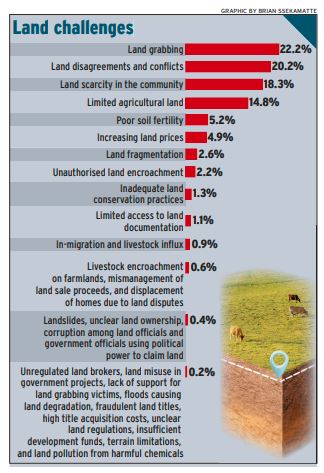
Land fund
To boost people’s security on land and address some of the key challenges, the government also set up the Uganda Land Fund in 1998.
Under the Land Fund, the government buys land from landlords where it resettles bibanja holders in selected parts of the country.
It aims to address historical injustices by enabling tenants to purchase land from landlords and facilitating the resettlement of the landless.
The fund, which had been halted in 2017 due to funding gaps, was revived in 2023.
In the financial year 2019/20 the Land Fund received sh36b and compensated 69 beneficiaries.
In January, this year, the lands minister cited challenges of inadequate funding, urging lawmakers to increase the Land Fund budget to enable her ministry to purchase more land for squatters.
The Fund required sh168.3b annually but received sh39.3b in financial year 2020/21.
The lands ministry has in the past noted that the Land Fund required an annual allocation of sh170b for 10 years or a one-off of sh1.7 trillion to compensate over 6,000 claimants.
Agaba lauded the Land Fund initiative, saying it facilitates a more equitable distribution of land rights. However, he noted that the Land Fund’s progress has been hindered by corruption and hypocrisy, which must be addressed, to ensure tangible benefits for those in need, particularly in central Uganda, where the bibanja issue persists.
Digtisation
The Government has also launched a digital land registration system, allowing citizens to verify property ownership and access land information remotely.
Through the online land information search portal, individuals can instantly check land title authenticity, associated transactions, and identify rightful owners.
The portal is accessible via a web browser or mobile application, and users can conduct searches at sh10,000, down from sh20,000 previously charged for the manual searches.
Scarcity, insecurity
Lawyer Arnold Kimara notes that Uganda’s growing population and international relationships have led to an infl ux of refugees, with over 1.8 million hosted in the country as of May 2025, hence resulting in scarcity of land.
Kimara suggests embracing technology and innovation to reclaim and optimise land use, given Uganda’s current rudimentary agricultural system.
The lawyer highlighted that inadequate land sensitisation contributes to insecurity, as knowledgeable individuals can exploit long-time land occupants by navigating the title acquisition process and seizing control of the land.
On July 31, 2025, Nabakooba disclosed that many Ugandans have lost land due to work done by unqualified or unregistered surveyors.
In a move to curb such abuses and to professionalise the land sector, the Ministry of Lands recently announced that all surveyors will soon be required to register before practising.
She said legal amendments to enforce licensing requirements have already been approved by Cabinet and are awaiting parliamentary approval.
The ministry is also expanding the Land Information System and supporting public education campaigns.
One of the more visible figures in this effort is State Minister for Lands, Sam Mayanja, who has taken a strong stance against fraud, visiting different parts of the country to sensitise locals and address disputes.
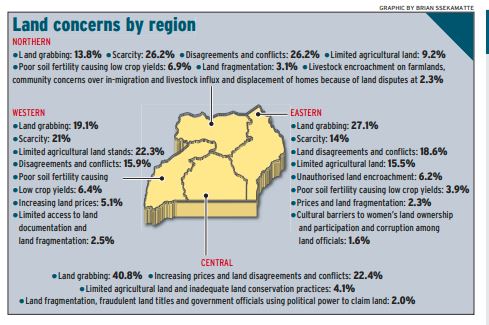
Tenure systems
Uganda’s formal land tenure system was initially established by the British during the colonial era. Since independence (1962), Uganda has reformed its formal legislation regarding property rights several times.
The most recent is the 1998 Land Act. According to the 1998 Land Act, there are mainly four recognisable land tenure systems in Uganda.
These include mailo, leasehold, customary and freehold land systems. Under the mailo land system, land is owned in perpetuity by the landlord.
Mailo land is more prevalent in the central region, and analysts say this is where disputes are more prevalent mainly because it allows dual ownership between landlord and lawful and bonafide occupants (bibanja holders James Mukasa Galabuzi, the chairperson of the Uganda Land Owners Association, states that during vote-seeking campaigns, politicians tend to classify all individuals on mailo land as bibanja holders.
He said this has caused confusion among actual landowners, who often end up in court to evict tenants.
He said the situation has led to unrest, stressing the need for Government intervention. Galabuzi pointed out that mailo land matters have been heavily influenced by politics, with land changing hands and many settlers laying claim.
Nabakooba recently reminded the public that busuulu is a fixed, non-negotiable fee determined by the government, and has not changed since 2011: Sh50,000 in cities; sh40,000 in municipalities; sh30,000 in town councils; sh20,000 on town boards; and sh5,000 in rural areas. To resolve the conflicts, Galabuzi suggested creating a profile for all mailo land that identifies the owner (both landlord and bibanja holders), location, and acquisition history.
Lawyer Kimara highlighted the benefits of freehold and mailo land ownership, stating they offer superior security for landowners compared to customary land systems.
He said with customary, the community can create third-party interests without others’ knowledge, leading to potential disputes and insecurity.
However, he noted that customary landholders often struggle to acquire titles, exacerbating insecurity and limiting access to capital.
How govt can deal with problem
Dennis Bugaya, the Buganda Land Board spokesperson said the rule of law must be upheld so that court decisions on land matters are not subjected to vetting by non-judicial entities.
Bugaya also advised that judges must be increased, mainly in the Land Division Court so that land matters are disposed of expeditiously.
He also said the Police’s investigative mechanisms must be improved so that investigations on criminal land matters are not delayed.
Bob Paul Mpiima, the chairperson of the Bibanja Owner’s Development Association Limited, said the Government should sensitise people on their land rights through their associations.
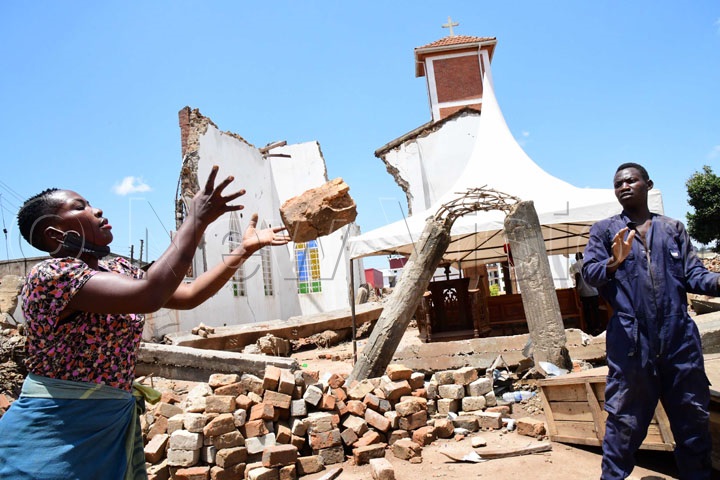
On July 31, 2025, Nabakooba disclosed that many Ugandans have lost land due to work done by unqualified or unregistered surveyors.
Regional variations
According to the Vision Group survey, land grabbing accounts for 22.2% of the major land-related challenges cited by respondents.
Land conflicts followed at 20.2%, land scarcity at 18.3%, and limited land for agriculture at 14.8%. Other issues included poor soil fertility (5.2%), high land prices (4.9%), land fragmentation (2.6%), encroachment (2.2%), and limited access to land documentation (1.1%).
Regionally, the survey revealed that land scarcity and land conflicts are the dominant issues in northern Uganda, each cited by 26.2% of respondents.
In the central region, rising land prices and land conflicts are the most pressing, at 22.4%, followed closely by limited agricultural land at 21.2%.
The western region is most affected by limited agricultural land, cited by 22.3%, followed by conflicts at 15.9%. In the eastern region, land conflicts topped the list at 18.6%, with limited access to land cited by 15.5%.
Bamugenereire report
The 2016-2020 Justice Catherine Bamugemereire commission that inquired into land matters received 8,528 complaints from 123 districts.
The Commission said the problem of land disputes had turned into a pandemic, in which mostly the well-to-do persons have obtained land through illegal means, bribing their way through all systems of land administration and registration.
The commission recommended the formation of a new outfit to handle disputes.
“The commission noted as way of resolving the emerging land conflicts, Land Environment Court should be presided over by a judge appointed by the President.
The Commission also recommended the enactment of a distinct wetland law to reverse the tempo at which wetlands are reclaimed in Uganda and to restore degraded wetlands, amend the law to curtail the excessive powers of the chief government valuer and the commissioner for land registration.
It also recommended that district land boards should be abolished because they engage in untold corruption.
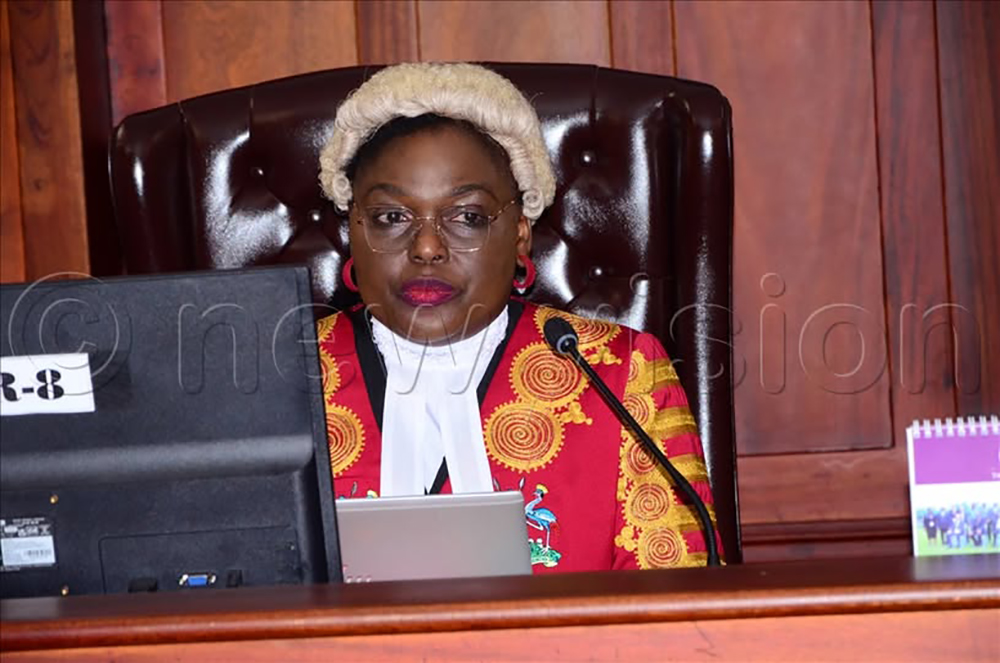
The 2016-2020 Justice Catherine Bamugemereire commission that inquired into land matters received 8,528 complaints from 123 districts.
Why land grabbing is persistent
In Uganda, where agriculture remains the backbone of the economy, experts said, land is not only a means of survival, it is legacy and livelihood.
However, over the years, its value has skyrocketed, particularly in and around urban centres, driven by rapid development, population growth, and a frenzied rush for real estate.
The rise of land brokers, estate agents, and speculators, experts added, has also intensified the scramble.
In the past decade alone, land prices have surged, turning parcels of land into prime targets for investment and outright grabbing. Land grabbing has also come in as one of the major vices — pushing out many people off their land.
According to the Vision Group survey, land grabbing prevalence was prominent in Luwero, Kikuube, Kampala, Moroto, Kaberamaido, Kyegegwa, Mpigi, Hoima, Rukungiri and Katakwi, among others. Particularly in Luwero, 88.9% of the sampled respondents expressed alarm over land grabbing.
Luwero is followed by Kikuube (85.7%), Kampala at 66.7% and in Moroto, at 62.5% .
Karamoja problem
Explaining the problem of land grabbing in Moroto district, Raymond Eriu, a resident of Moroto Municipality, said the challenge is perpetrated by “wealthy individuals who do not want others to prosper.
Mickydad Lokimu, an activist based in Karenga district in Karamoja-sub-region said land issues in Karamoja are deeply complex and remain a source of tension and conflict.
He added that the region has a unique cultural, historical and socio-economic context that makes land governance particularly challenging.
“Key land issues in Karamoja include: communal land ownership, where most land in Karamoja is held under customary tenure, often communally owned by clans or communities,” he stated.
“Weak legal protection, despite legal frameworks like the Uganda Land Act (1998) recognising customary land rights, fuel a lack of formal land registration. Many communities don’t have the resources or knowledge to secure legal titles.
Pastoralism versus development is the other problem because Karamoja’s traditional way of life is nomadic pastoralism, which requires open, shared rangelands. However, encroachment by mining companies, large-scale agriculture, and infrastructure projects has disrupted access to grazing land,” Lokimu said.

Land economist John Walugembe said land as a major factor of production is always on demand, a trend that explains why land grabbing is prevalent in Kampala and Bunyoro-based districts, such as Kikuube, where massive oil activities is taking shape.
The survey
The poll was conducted by Vision Group’s research team between March and May, 2025, covering a sample size of 6,006 Ugandans countrywide.
They were each asked the question: “In your opinion, which issues are affecting this community?”
To ensure national representation, the Vision Group research team sampled eligible Ugandan voters from across 58 districts.
Only citizens possessing a valid National Identification Card and aged 18 years and above were sampled. The survey covered all the 17 sub-regions of Uganda.
The respondents were randomly sampled from both rural and urban areas. Of the total respondents, 2,433 were from urban areas while 3,573 respondents were picked from rural areas. According to the survey, majority of the respondents were between the age of 25 and 29 years (1,201) and 30 and 34 years (1,058).
Only 19 of the total sampled respondents declined to respond to the questions.
New Vision editor-in-chief, Barbara Kaija, explained that the Citizens Manifesto is a compilation of Ugandan views collected by a team of professional researchers ahead of the national election.
Expert views
According to Peter Walubiri, a senior constitutional and land lawyer, land grabbing in Kampala is mainly caused by a shortage of land as the population grows, leading to increased pressure.
He also said there are people in Kampala who have acquired a lot of money illegitimately through corruption and find it difficult to invest in regular business.
“So, the only thing they know is buy land, build,” he said, adding that the rich store their wealth in land and that most of them do not go through normal processes to acquire land.
Land economist John Walugembe said land as a major factor of production is always on demand, a trend that explains why land grabbing is prevalent in Kampala and Bunyoro-based districts, such as Kikuube, where massive oil activities is taking shape.
Commenting about the situation in Kikuube, Asaph Tusigwirwe, a resident of Kidoma village in Kiziranfumbi sub-county, Kikuube district, land conflicts are escalating due to lack of land titles among most residents.
The Government plan, according to the 2025/2026 national budget, is to inject sh171.9b into the land fund to compensate absentee landlords across the country.
The move is to protect tenants and squatters from eviction. For Luwero, Ronald Ndawula, former Luwero LC5 chairperson, attributed land grabbing in the district to the influx of people from across Uganda and neighbouring countries, such as South Sudan.
He said this is because Luwero is near Kampala, making land highly sought after.
Ndawula also noted that wealthy individuals buy land in Luwero and then use their influence to evict existing occupants.
George William Ssentamu, a land expert and lawyer, said the only problem and solution to land wrangles and problems in Uganda is law implementation.
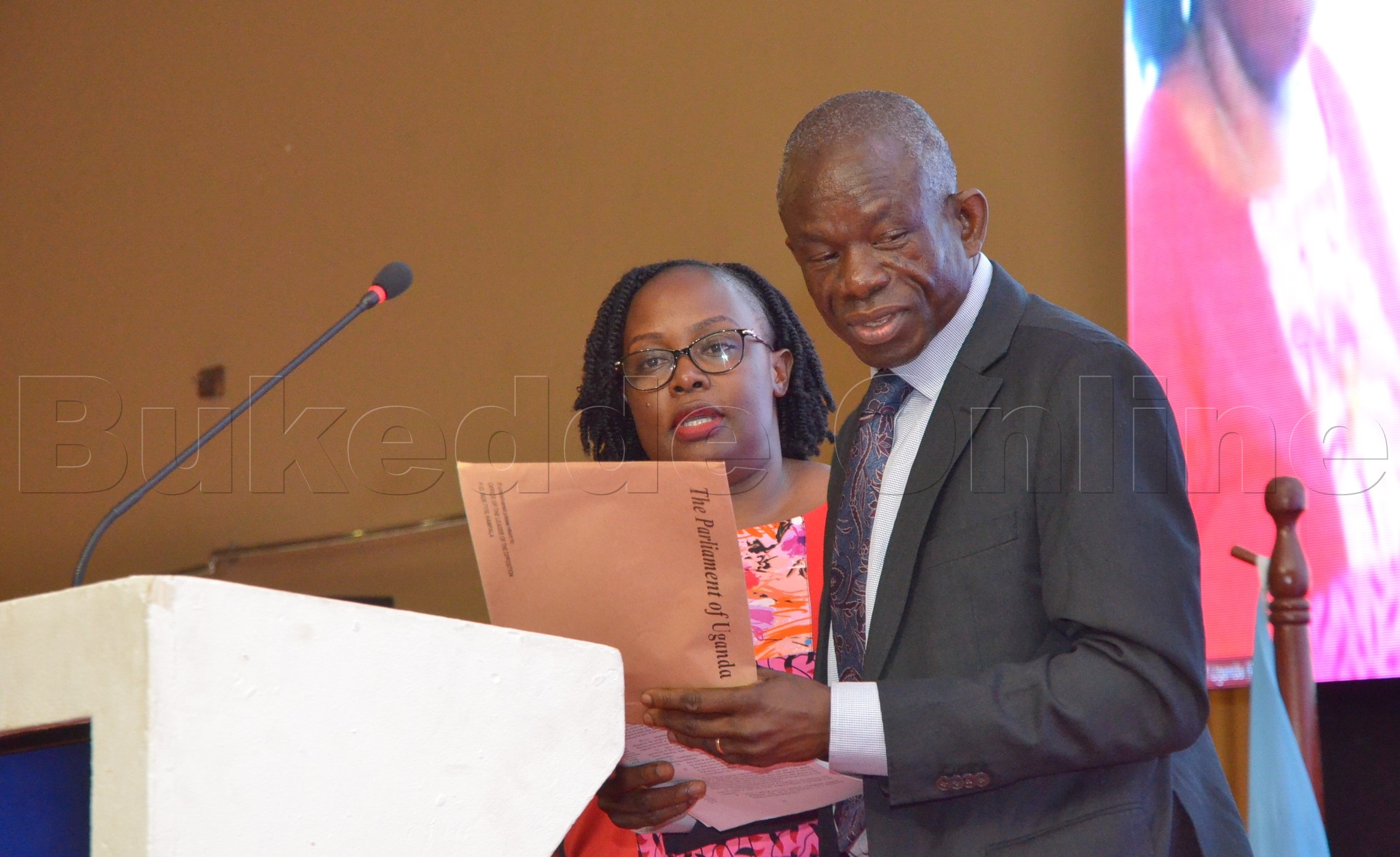
Peter Walubiri, a senior constitutional and land lawyer.
What others say
OKELLO Kadir, bodaboda rider in Lira
Local leaders and MPs must prioritise ensuring equal treatment in land matters. In Lango, affluent individuals often outmanoeuvre rightful owners through the courts.
Edmond Bwire, Sssembabule
Land conflicts in Sembabule necessitate urgent government intervention to leverage the Land Fund in safeguarding the rights of vulnerable communities and preventing forced evictions.
Denis Karusabe, Kikuube
The Government should recruit more judicial officials so that land cases can be given a priority. Many cases are still lagging in courts and they have not been resolved, resulting into murders.
Justus Okello, Hoima
I want the government to abolish land boards because they are responsible for the increasing cases of land grabbing and corruption.
Ramathan Byonta, LC1 chairperson Katuugo Cell, Hoima
Government should ensure that people get land titles at no cost because many people cannot afford the cost of acquiring titles which has left their land vulnerable to potential grabbers.
Jennifer Issa, from Oyalem, in Kalaki district
Land grabbing is driven by harmful cultural practices that fail to protect vulnerable groups, such as widows, women, and orphans
Chales Oyoga Jomoa from Okile, Kaberamaido district
The insurgency that forced some people to flee and abandon their land has led those who remained to seize the remaining land due to increased population pressure.
Jane Francis Pedun from Anyara Moru, Kalagi district
Land grabbing, especially by institutions, is often caused by the younger generation’s lack of appreciation for the reasons their grandparents offered the land to those institutions in the first place.
Geofrey Anabu from Ochero
Land grabbing is caused by weak government policies meant to protect vulnerable people, which powerful individuals exploit to their advantage
Additional reporting by Michael Odeng, Peter Abaanabasazi, Godfrey Ojore, Michael Onyinge, Charles Etukuri and John Museze